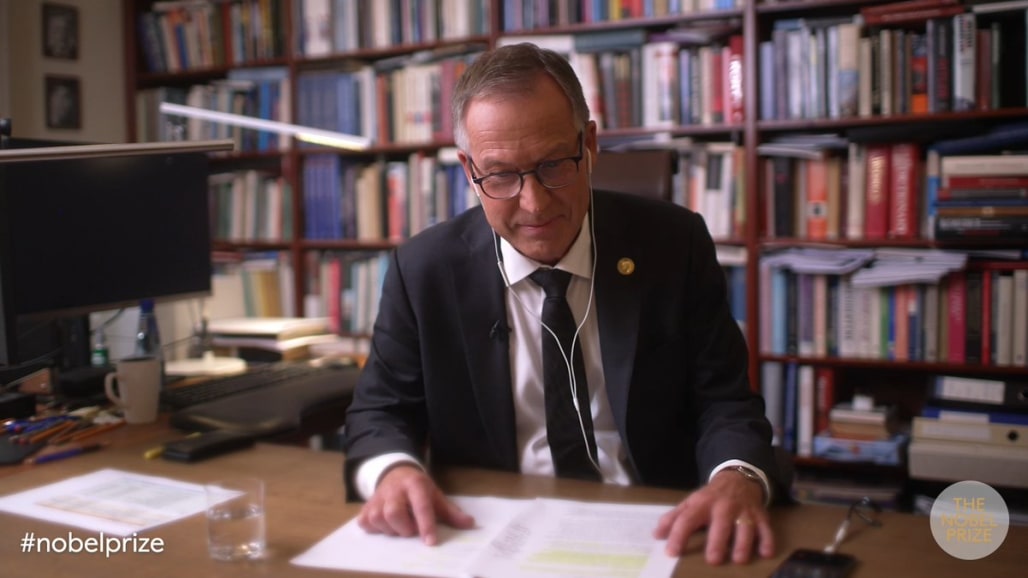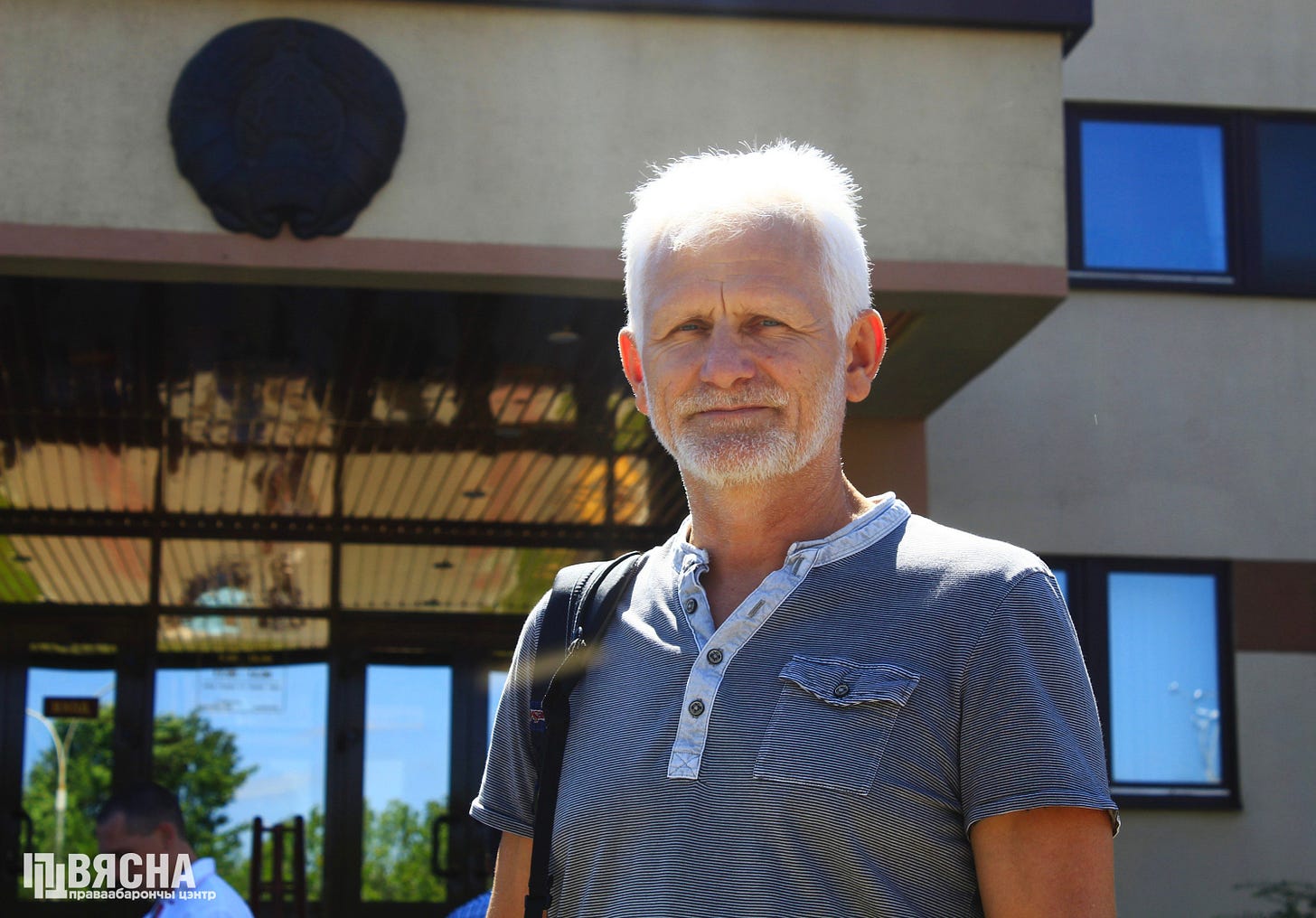Oct 9- The Nobel for Peace 2022
Who are Ales Bialiatski, The Centre for Civil Liberties in Ukraine and Memorial
The Nobel for Peace 2022
Awarding this year’s Nobel Prize, the committee said the winners have "promoted the right to criticise power" in their countries.
Those honoured in Russia and Belarus today have worked for years to shine a fierce warning light on the rise in repression in both countries. Since February, Ukraine’s Centre for Civil Liberties has been documenting the consequences of that – recording the war crimes, committed in Ukraine by Russia, using Belarus as a launchpad.
Human rights in Russia - as well as its neighbour and ally Belarus - have been under renewed scrutiny after the Nobel Peace Prize was awarded to campaigners in both countries.
The UN Human Rights Council has approved appointing a special expert (known as a rapporteur) to monitor human rights in Russia.
Franak Viacorka congratulates Ales Bialiatski
My congratulations to Ales Bialiatski for receiving the Nobel Peace Prize! Ales is an outstanding Belarusian human rights defender and the worldwide symbol of the fight for freedom and dignity. @NobelPrize made an excellent choice! I am humbled to know him personally.
Ales Bialiatski is a living legend of the Belarusian fight for freedom. He was jailed & beaten multiple times, but he got up and continued his struggle every time. In 2020, he was awarded the Sakharov prize with the representatives of the Belarusian democratic forces.
Ales started as a Soviet dissident and dedicated his life to two of his passions - a free and democratic Belarus and a fair and just world where human rights are respected. He became the famous worldwide symbol of human rights defenders.
He is also a reliable friend to me. Every time Lukashenka's regime would put me behind bars, Ales would always be there to help me in all possible ways. He stood firmly by those who suffered from the tyranny of the regime.


Bialiatski's wife said she was "overwhelmed with emotion"; his compatriot, the dissident Svetlana Tikhanovskaya, said it represented "important recognition"
Bialiatski founded the organisation Viasna (Spring), @viasna96, in 1996. Viasna evolved into a broad-based human rights organisation that documented and protested against the authorities’ use of torture against political prisoners.
As of October 7, 1348 people are being held as political prisoners in Belarus.
Bloggers, businessmen, presidential campaign members and peaceful protesters are held in prisons only because they were not afraid to exercise their rights - the right to participate in peaceful assemblies, to express their opinion and to be involved in political activities.
Most of these people were targeted by politically motivated criminal prosecution in connection with the events that took place during and after the presidential election of August 2020.
What's has been happening in Belarus?
In 1996, the country witnessed a brutal crackdown on street protests against the authoritarian government of Lukashenko
Lukashenko has ruled Belarus with an iron fist since 1994 and has been accused of supressing democracy
Massive street protests erupted again in August 2020 over a discredited presidential election - with demonstrators violently arrested
Dozens of independent journalists and bloggers were also prosecuted and imprisoned - and nearly 500 websites, including those of major international news outlets - were blocked for their independent reporting, according to Amnesty International
There were widespread claims of officials torturing detainees. Lukashenko himself admitted to the BBC last year that violence had been used on protesters
Memorial…
Established in 1987, Memorial is one of Russia's oldest human rights groups, and it was liquidated last year by the Kremlin.
Memorial's work focused on the terror of Josef Stalin's dictatorship and more generally under the Soviet era. For decades it helped uncover the reality of Soviet repression and the many rights abuses committed ever since.
Memorial is based on the notion that confronting past crimes is essential in preventing new ones. The organisation has also been standing at the forefront of efforts to combat militarism and promote human rights and government based on rule of law.
During the Chechen wars, Memorial, @EnMemorial, gathered and verified information on abuses and war crimes perpetrated on the population by Russian and pro-Russian forces. In 2009, the head of Memorial’s branch in Chechnya, Natalia Estemirova, was killed because of this work.


But under the rule of Vladimir Putin, who has tried to re-write the history of Russia, Memorial became a nuisance in highlighting the crimes of a past he wanted to extol.
That's why prosecutors accused Memorial of distorting historical memory, rather than its true role in helping millions of families whose lives were traumatised by the Stalin era.
Centre for Civil Liberties, Ukraine
Message from the Centre for Civil Liberties: “Proud to be awarded Nobel Peace Prize this is a recognition of work of many human rights activists in Ukraine and not only in Ukraine @avalaina and @ccl_ua ready to protect human rights.”
I think the best way to understand exactly why the Centre for Civil Liberties in Ukraine has been awarded the Nobel Prize for Peace is to listen to a chat Olga and I had with Oleksandra Matviichuk – the head of the organisation. Oleksandra has been an indefatigable human rights and democratic reforms campaigner for many years in Kyiv.
Her organisation carries out the difficult work of interviewing people who are the victims of human rights abuses and crimes, and sends those reports to national and international criminal courts and institutions. She works with a network of 100s of voluteers.
Oleksandra posted this on FB today:
Armies are speaking now, because before the voices of human rights defenders were not heard in our region. We may have been listened to at the UN Human Rights Committee, but definitely not in those halls where decisions are made by people in power.
If we do not want to live in a world where the rules are determined by whoever has the most powerful military potential, rather than the rule of law, this state of affairs must change.
The interviews in this next post are what Oleksandra and her volunteer of investigators deal with every day and have been since 2014.

Please watch this. It’s the moment the Centre is informed they have won the Nobel. The Centre and Oleksandra are already widely respected in Ukraine. Being awarded the Nobel will increase visibility abroad and hopefully donations so they can continue their work.







